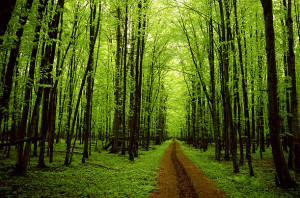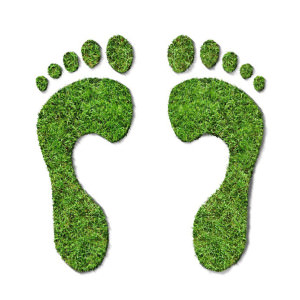The Carbon Farmer
Couple saves the world one tree at a time
By Fernando Arce, Editor in Chief
How many times has your future stared at you outside an elevator door? Well, it happened to Brad and Rebecca Rabiey, who met outside an elevator at the University of Alberta some 10 years ago as they went to check their grades for a criminology class. She was arriving; he was just about to leave.
“It was one of the best examples of serendipity,” says Rebecca. “We just kind of small-talked and it just went on from there.”
It’s a cute story, that’s for sure; but this isn’t a love story … at least not all of it. Today, Brad and Rebecca are so much more than just another couple with a cute story—they are the founders and leading forces behind The Carbon Farmer, one of the newest businesses to have entered and slayed their way through the CBC’s the Dragons’ Den earlier this year.
“It was the right time to really grow the business,” said Brad of the whole Dragon experience, who is only 29 years old, same as Rebecca. “And it was a great way to do that both from a publicity standpoint, as well as from an investment and strategic perspective.”
[pullquote]Their pilot project back in 2007 resulted in 3,000 species planted personally by Rebecca and Brad in a matter of two days.[/pullquote]Like many other Canadians, this whimsical couple from Northern Alberta became big fans of the show, but they took it a step further, seeing the opportunity there was for eco-friendly businesses to really take off. They grew their business till the right point—taking in “as much experience and expertise as you can have in [the] industry,” said Rebecca, before finally attending the show earlier in 2012, after mock-rounds staged within their community. The couple went in front of the five Dragons intent on slaying the beasts. And indeed they did.
Bruce Croxon and Arlene Dickinson both were immediately engaged by the product, and they even got down and nasty in a tree-planting demonstration. At the end of battle, the couple ended up receiving $40,000 for 40 percent of their business.
Trees and Carbon Credits
The Carbon Farmer benefits its clients, which includes virtually anyone and any company, in two different ways.
“One is through our Create Your Forest Website,” says Brad, “which enables people to have a tree planted and cared for in their behalf to restore habitat in the Boreal region or other areas of Canada.” Their pilot project back in 2007 resulted in 3,000 species planted personally by Rebecca and Brad in a matter of two days.
“We were total newbies at it,” says Rebecca, unable to contain her laughter. “We did so much research including watching Youtube foresting clips of how you actually plant a tree and talked to nurseries and things like that.” By the end of this summer, they gained some major clients who are requesting 120,000 trees planted for the fall. “But there’s no way Brad and I could do that on our own. So we have acquired crews that help us do that and now we have sort of become project managers.”
This aspect of their business focuses on the importance of bringing back a beautifully unique but vital habitat in the Canadian landscape, which has been affected by conventional farming practices and industrial development over the years.
Braid explained that their efforts were aimed at “restoring the places for wildlife to live and to grow healthy, and do things like filter the water,” praising the “purifying effects which forests are so good at doing in a natural way.” People have the option of buying a personalized tree for $1.99 each, and they can visit that tree in the virtual forest through The Carbon Farmer website. They are also continuing to grow food-crops on the best of their family’s land-base (an effort dubbed the Grain Perspective), which is born out of the realization that not all land should only be filled with trees. “We realize that we need food production,” he said. So the “rest of the land in our family farm is being transitioned to organic grain production.”
The second benefit offered by The Carbon Farmer is found in the carbon that those trees offset.
“We work with individual businesses and special events to ensure that they can offset their carbon footprint from things like driving or flying or heating their homes and offices,” Brad said. “Some businesses are regulated by the government to reduce their footprint or offset the remainder. And then there are people that just do it for corporate social responsibility.”
“It’s actually been really reaffirming,” said Rebecca, speaking about the surging pattern among Canadians (individuals and companies) eager to contribute to their vision. “There are a lot of people out there that are ecologically minded. And there’s also the small business uptake that we’ve had since being on the Den.”
Brad agreed, happily pointing out that many companies are also doing it voluntarily. “Our client-base at this point is made up of people who aren’t being told by the government to do it, but just because it’s the right thing to do. It’s definitely been a sign of how progressive Canadians are.”
This part of the business works by taking advantage of the carbon credits created by the trees planted. “We plant trees, which create habitat,” says Brad. “And in comparison to the life cycle of tilling the land, we are creating carbon storage as well, which we can sell as carbon credits.” [pullquote]There are a lot of people out there that are ecologically minded. And there’s also the small business uptake that we’ve had since being on the Den.[/pullquote]
The Family and the Farm
The first land the couple began to work on was the third generation family farm Brad had tilled. “I think I probably dragged Rebecca in a little bit, being as how it was mainly a family farm,” Brad chuckled. “We also had land that probably should have never been cleared right along the river and wetlands, and maybe some poorer quality land as well. So we kind of looked at solutions to problems that we were facing on the farm so as to ensure that it stays in the family for future generations.”
Since then, their project has gotten bigger, featuring such major clients like Edmonton’s Wheaton Honda (formerly Millwoods Honda) who at one point came out to plant trees themselves. The couple has moved on to working with “landowners, conservation groups, land trusts, and municipalities that hold land that they acquire to protect but don’t necessarily have the resources to restore in terms of their former grandeur or ecosystem.”
Perhaps the most remarkable thing about the business is its very own profit model. “We came at this from the triple bottom line of People, Planet, and Profit,” Rebecca explained. “Brad with his science background and me with my social background, has allowed the business to be very holistic because we are not just considering the dollars and cents but the wild-life behind it; the environmental impact behind it; as well as the community and people that are impacted.” Rebecca is a social worker by profession, and says that “these things … are of value in our business.”
And indeed they are. In the past, Brad told me, they’ve done “various things in terms of educational outreach events.” Right now they are donating $2551 out of their Community Fund, which receives a dollar of every carbon credit (tonne) they sell, to anyone that has a community project that will reduce their carbon footprint.
The Carbon Farmer certainly seems like it’s on its way to success. But the road hasn’t been all smooth, particularly because they’ve rattled the cages of conventional farming and introduced a revolutionary shift.
Rebecca explained one of the hurdles. “[Brad’s] dad had spent his early days helping his dad clear the land. So to have us begging him to plant it all back in the very field that he cleared has been, as you can imagine, a huge paradigm shift for all of us. It’s now at a point where we have much more understanding and work together. But at the beginning, it was really hard to get the full support and understanding from Brad’s dad that this is indeed a business and a concept that can go somewhere.”
“I think with my dad, at the end of the day, it was the belief in what we’re doing,” Brad added. “And we saw that from the Dragons and from most of the people that we’ve talked to—that they see a genuine care for the land and the environment and a genuine belief in what we’re doing. And I think that definitely engages.” Not farming conventionally also means that there won’t be any use of pesticides or herbicides, allowing them to be certified organic.
Currently, The Carbon Farmer is selling internationally, with clients in the US, the UK, Australia, and elsewhere. By 2013, they hope to have projects in four different provinces in Canada, ultimately aiming, down the road, to have boots on the ground in Africa and Australia.
If everything goes right, and there is no reason why it shouldn’t, this couple will grow together, waking up side by side in the glory of a third generation family farm, doing what they love. “As long as that spark remains,” said Brad, “I hope we keep planting till we’re old and gray for sure.”
RESOURCES:
- Carbon Farmer
- CBC Television
- You Inc (Arlene Dickinson foundation)
- Interview with Brad and Rebecca Rabiey.

































Share the post "The Carbon Farmer"